Dragon Age: Absolution Producers Discuss Bringing the World of the Games to Netflix
In 2009, BioWare first introduced video game players to the world of Dragon Age with the release of Dragon Age; Origins. More than a decade and two sequels later, Dragon Age has a sizable fanbase and has expanded into animated direct-to-home media films, novels, comic books, and tabletop roleplaying games. Dragon Age came to Netflix earlier this month with the six-episdode anbimated series Dragon Age: Absolution. The series offered Dragon Age fans an opportunity to visit Thedas, the world of Dragon Age, while they await the next installment of the beloved video game series, Dragon Age: Dreadwolf, introducing viewers to a whole new cast of characters on a secret mission into the Tevinter Imperium.
What is it that makes Dragon Age so special to so many fans? And what did it take to bring that essence to animation in Dragon Age: Absolution? ComicBook.com had the opportunity to speak to Dragon Age Creative Director John Epler and Dragon Age: Absolution showrunner Mairghread Scott about exactly that.
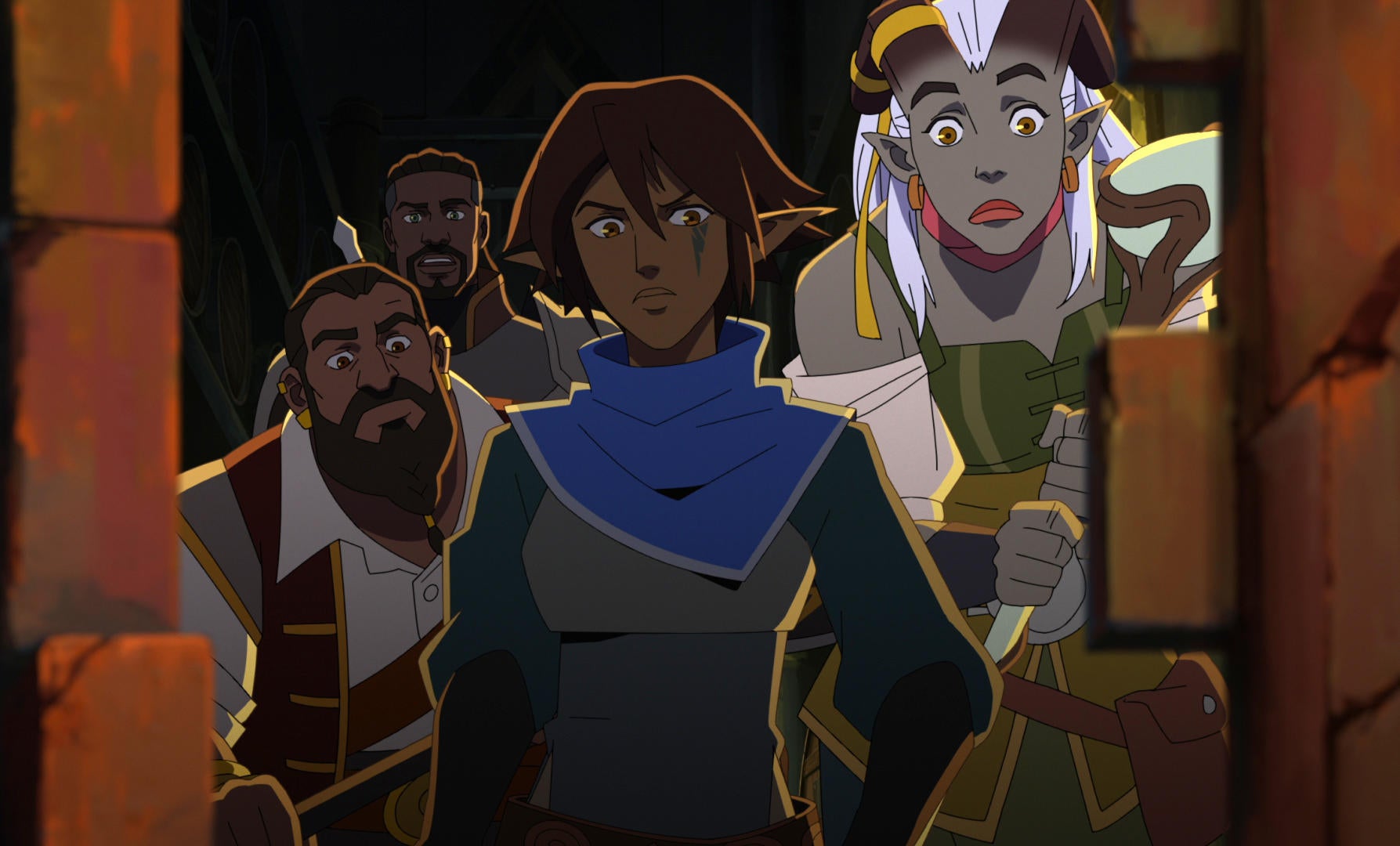
To start with, what are the central themes, concepts, styles, or whatever else that you feel defines a Dragon Age story? What is that specific Dragon Age flavor, in your mind?
John Epler: I think there's a bunch of different elements. I think one of the biggest ones for me, and one of the things that give us the freedom to upset the apple cart, is unreliable narrators. You think you know how things work, but it's rare that you actually do, and it's rare that everything is exactly what it seems. It gives us opportunities between games. Using Tolkien, for example, Tolkien is a very established lore. You know what happened, you know when it happened. With Dragon Age, it's a lot more fluid. From our perspective, it gives us opportunities to ask questions like, "What if that didn't actually happen that way? Maybe the world isn't what people think."
Power at a cost is another one, the idea that power always has a cost, whether it's a cost of who you are or if it's a more subtle cost. It costs you your relationships, or your friendships, which is a pretty common fantasy theme, but one of the things in Dragon Age is how literally it manifests sometimes, whether it's through the cost of blood magic, the cost of demons, demonic possession, or in the case of Dragon Age: Absolution, the cost of everything that was done for Rezaren to achieve his goals.
Beyond that, I think Dragon Age is ultimately a story about the characters. There are big world-changing events, and there are big sweeping consequences, but ultimately, the really interesting bits are what happened with the characters, and how the characters relate. To use Dragon Age: Inquisition as an example, you're the Inquisitor. You stopped the end of the world, but I think I've always found it more interesting, and we would love to do more with this, using Solas as an example, using Corypheus as an example, how did they get to where they were? Being able to dive into that thought process and dive into that psyche, really being able to understand where they're coming from, even if you don't agree with it, because ultimately, they are supposed to be characters, not just caricatures, not just "big bads." They may be big bads, but there's more to it than just that.
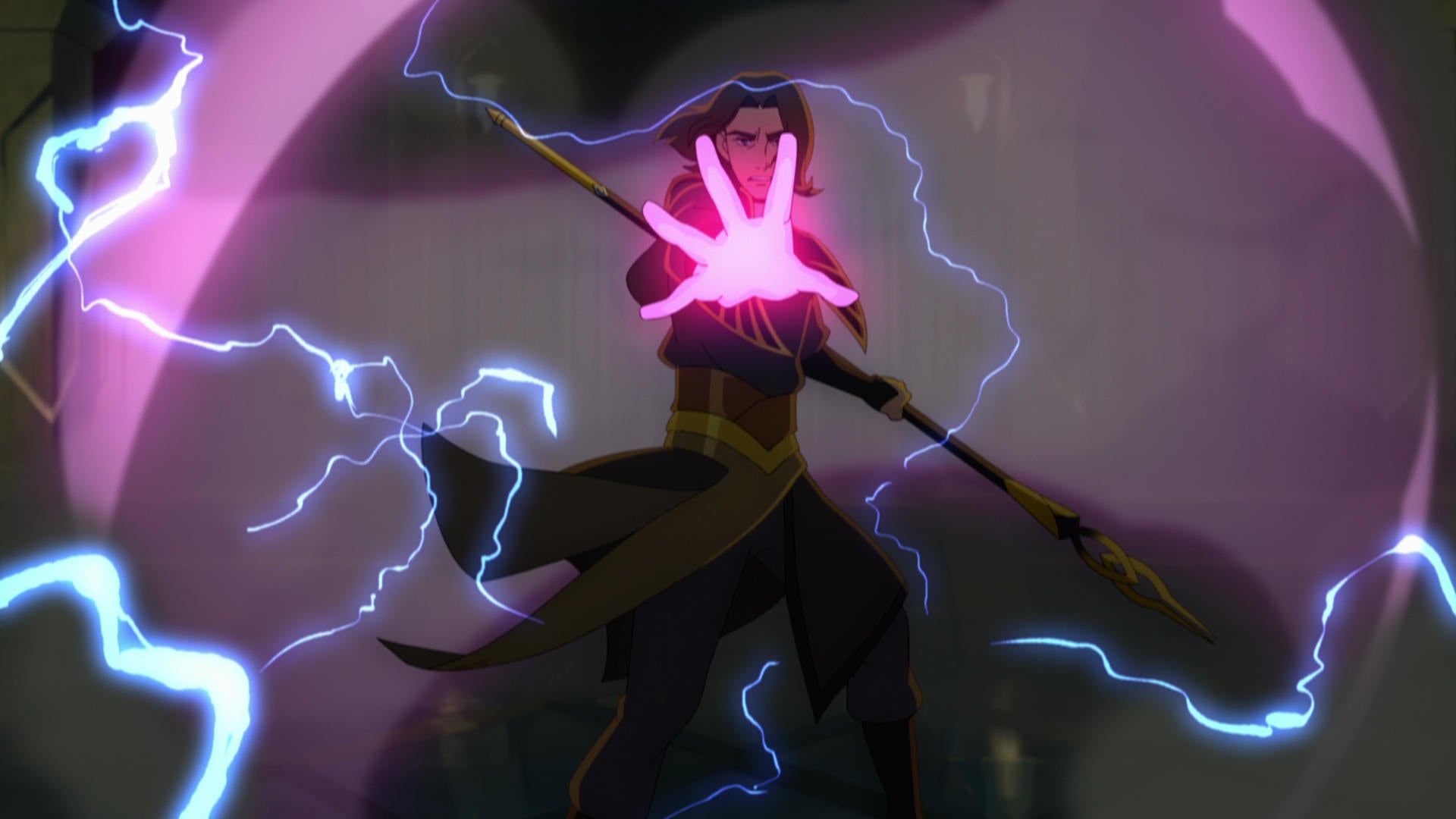
How did that translate into Dragon Age: Absolution? Compared to the Dragon Age games, the show feels like a more intimate, smaller-scale story.
Mairghread Scott: We knew with six half-hours we weren't going to be able to take you to 30 different countries and give you a bunch of different missions. Our goal was never to build as epic an adventure as Inquisition, but we wanted it to feel like Dragon Age. We wanted Miriam's story to feel as epic and as dire as someone facing the end of the world because, in a lot of ways, she faces the end of her world. We really wanted to invest in these characters and give you characters that are really flawed, but ultimately, most of them are heroic.
It's funny that one of the things that John touched on was a really important thing for us writing Absolution, which is that it's a little bit funny that Miriam's the only person who doesn't think she's the hero of the story. I remember when working with the actors, we told Hira (Sumalee Montano), "You need to play this as if you are the hero of the story." We told Rezaren (Josh Keaton), "You need to play this as if you are the hero of the story. You need to play this as if you're right," because that's one of the things that I love about Dragon Age, that it's rare in the world for someone to wake up and say, "I'm going to do bad things because I'm a bad person." People do the things they do because they think that that's the right thing to do, and their viewpoint is so warped, or their reality is so warped. We felt like we wanted to give you characters that felt a little more real, and that felt like Miriam's not perfect. She's at times a very vulnerable character. She's really been through hell and the show puts her through hell again, but we wanted to give her the space to express a full range of emotions. I didn't want to worry so much about making her perfectly likable because someone who's been through hell like that isn't perfectly fine. It leaves scars and we wanted this to be a chance for her to try and start to heal some of those scars, and with our other characters to show characters who also aren't perfectly noble heroes.
Ultimately, our heroes are heroic because they decide to put other people's lives before their own and to band together and try and do something they're not even sure they can accomplish because it's the right thing to do. I think that that's a really valuable story nowadays, which is why I think Dragon Age is a very valuable property and not just monetarily. I think it's an important property to have a fantasy setting that really confronts people to go beyond, "Well, this person showed up and said, 'I'm a hero,' so they must be right."
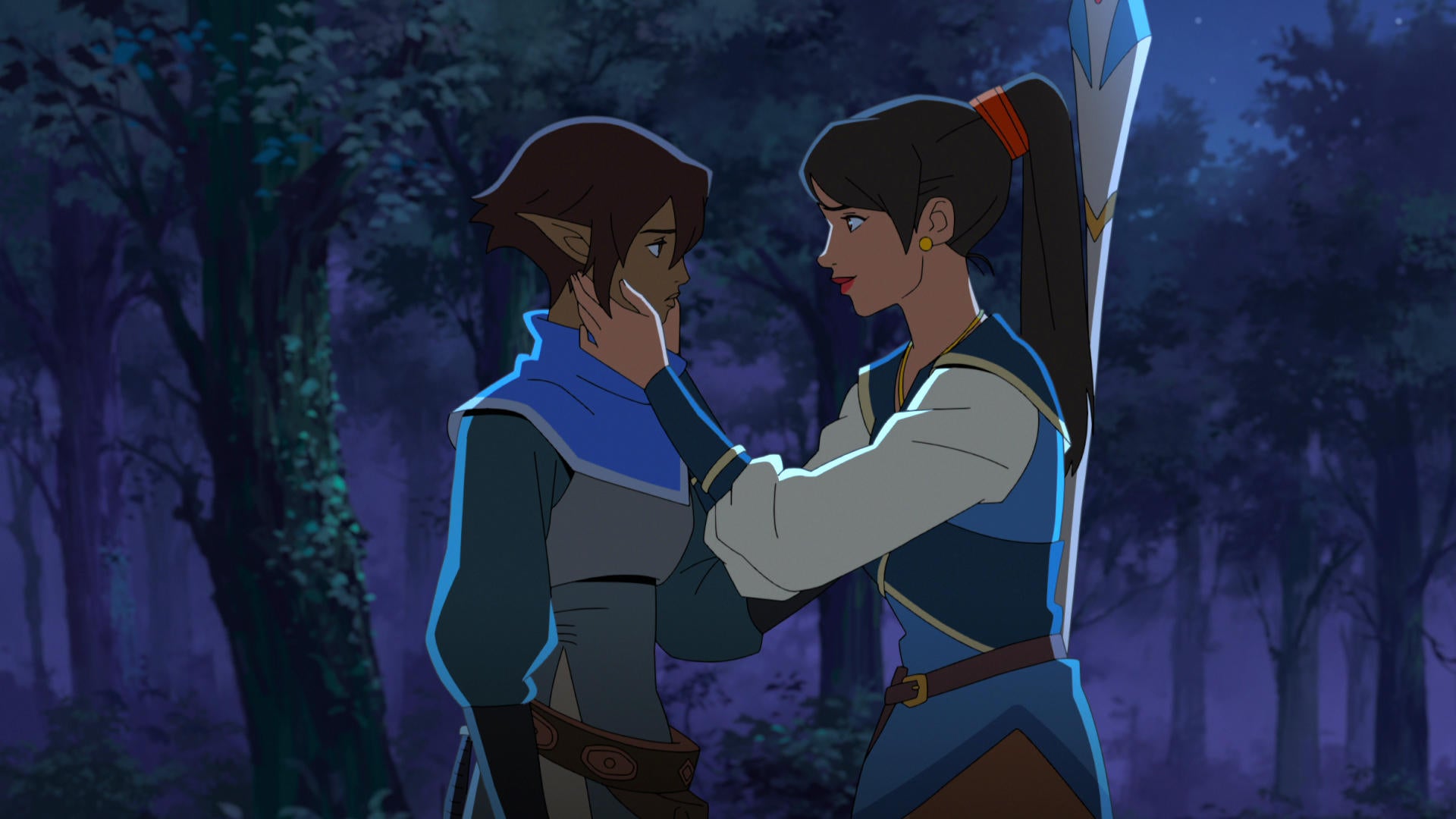
Part of Miriam's story is her background as a slave in the Tevinter Imperium. Dragon Age now has been around for more than a decade now, and in that time, it feels like the way a lot of us discuss things like slavery, especially when it is tied to race, has evolved. Can you talk at all about your philosophy when dealing with such a topic that carries such real-world weight and trauma and using it in fiction?
MS: Obviously it was something that was really important for us to -- it feels strange to say to a "treat well," because it's such a terrible thing, but really, it was important for us to try and depict it in a way that felt a little less easy and a little less nuanced. There's a mage we meet in the first episode in the bar who's basically like, "I'm going to assault Miriam in an alley." You're like, "Yeah, he seems bad." That's a really easy story to tell, and you have the bar fight. The bar fight's really fun and everyone's like, "High five, we did it." And Miriam's speech is, "That's not actually really the problem, that didn't actually help anything." It's trying to push past the easy narrative.
Rezaren sincerely believes that he's doing the right thing because people don't wake up in the morning and think that they're doing the wrong thing and then continue on. You have this other example of a hero, these characters who aren't necessarily lying about what they want, but ultimately, what they want is grotesque. What they're willing to do is a bridge too far, and we wanted the audience to face that in a way that didn't feel like we killed the cackling bad guy. We didn't want it to feel like you could just kick him into a volcano and then everything is fine.
It's interesting when you build a sympathetic villain, and you talk a lot about sympathetic villains. I think that the interesting thing about Hira and Rezaren in terms of our villains is that they have a lot of sympathy, they don't have a lot of empathy. They feel bad when people are hurt by their actions, but they can't really put other people's needs above their own or other people's needs, in Hira's case, above the importance of her cause.
It was also really important to give Miriam some space to be less than perfect. She's someone who's been through hell and we wanted that to not be her only defining characteristic, but we wanted to give her a chance to show some scars and to not be perfectly well adjusted and make the right choices all the time and be 100% capital-H "Hero," but be someone who's really struggling with any kind of sense of self-worth and finding and fighting for herself so that even if these kinds of systems of oppression aren't familiar to you as a viewer, that feeling that maybe you're not worth it, that feeling of that person who says that they have your best interest at heart so they don't have to listen to you, that's something that resonates, I think, with all of us.
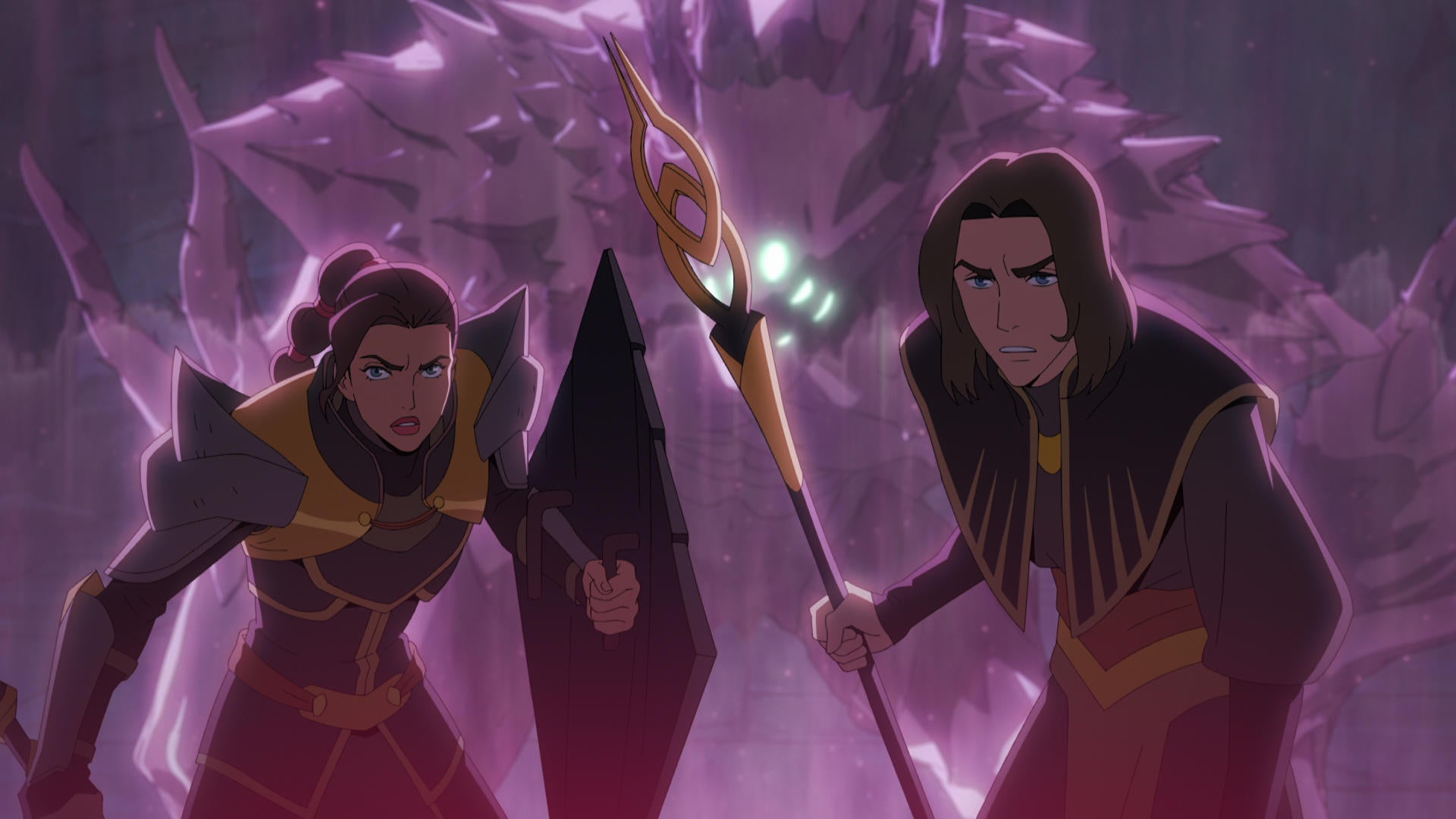
Do you have anything to add to that, John? I know we're not talking about Dreadwolf today, but as Tevinter becomes a bigger and more relevant presence in the larger Dragon Age narrative, I imagine this is a conversation that might be happening.
JE: A lot of it just comes down to being very sensitive, being thoughtful about how you do it, as Mairghread said, not using it just for shock value, not using it as a blunt instrument, but being understanding of not only how it exists in the fiction, but whenever you're being allegorical or referencing back to the real world, understanding what stories you can comfortably tell and what stories you shouldn't. I think, as a creator, that's very important because we all have our own lived experiences. For some people, those lived experiences are going to be a lot more intertwined with systems of oppression and oppressive institutions.
For someone like myself, it's not really my story to tell and to try to be the person who's like, "Oh, and it's actually like this," so we like to engage consultants. We like to make sure we're being very thoughtful. Also, sometimes it's just reevaluating things that you've said or done before. You don't want to be like, "Oh, we never did this," but also you maybe want to like, "You know what? It maybe made sense 10 years ago or however long ago, but maybe now we're not going to go quite in the same direction. Maybe we're going to put some more nuance in it or maybe take it in a slightly different way."
I think it really just has come down to being, as Mairghread said about sympathy versus empathy, trying to be empathetic to people who may be consuming this media and how they may be impacted, how they may be, in some cases, hurt by it. Trying to be aware of that by being deliberate in your storytelling decisions is, I think, what it comes down to. Don't be careless. Be very thoughtful and be willing to grow. Be willing to take feedback. Be willing to take that criticism. Be willing to take people saying, "Hey, you did this thing and that actually really sucked for these reasons," and being willing to sit there and say, "You know what? I hadn't thought of that. Let me listen to that perspective and hear that perspective."
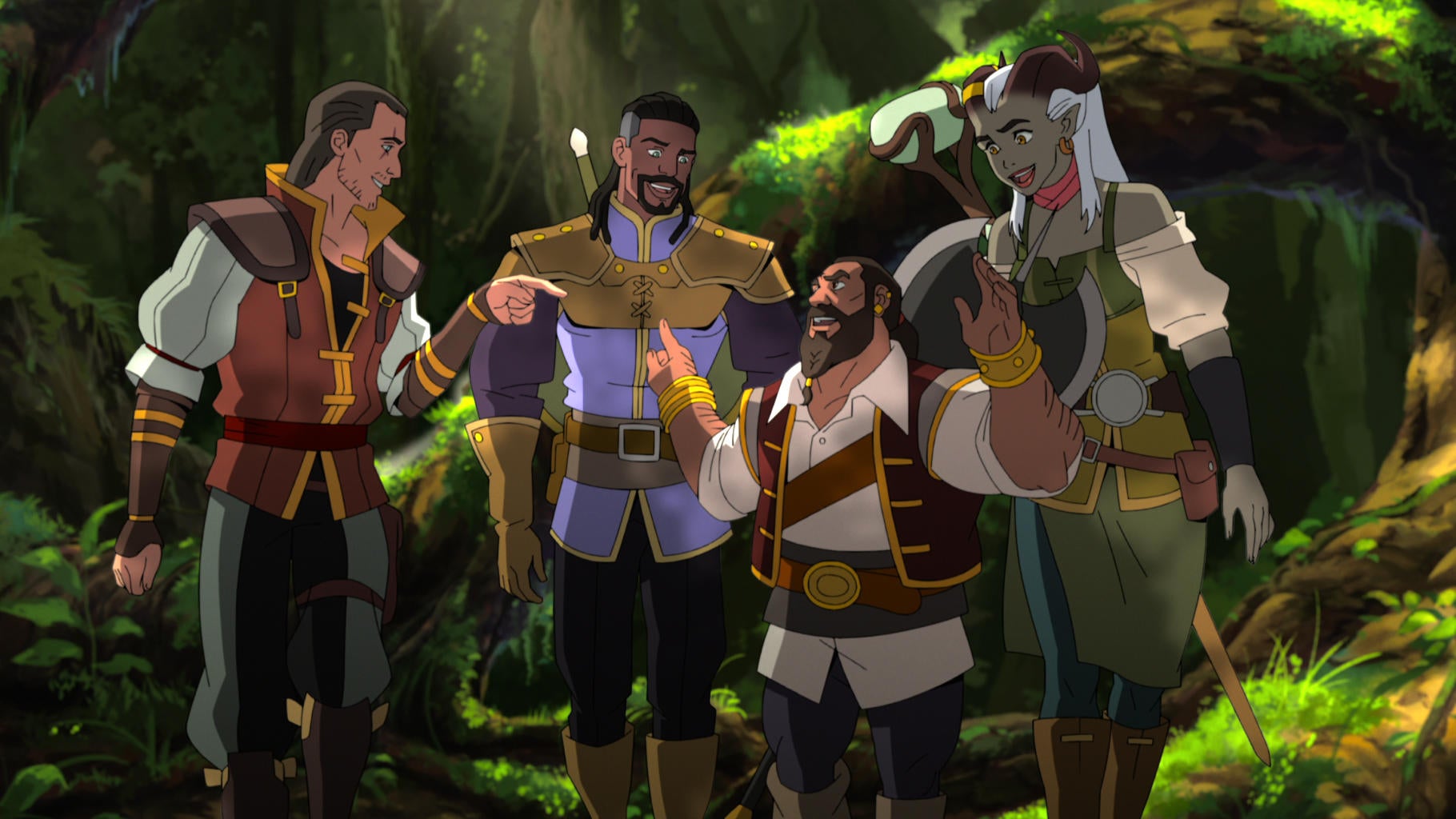
The Dragon Age games are pieces of heroic fantasy. You're cast as a hero, and the games let you decide who your hero is or how they behave, but at the end of the day, you're still expected to be the protagonist and save the world, if nothing else. What do you think Dragon Age has to say about heroism, and what makes a hero, and how is that tied up with all the themes of sacrifice that you've mentioned throughout this conversation already?
JE: I think one of the things that Dragon Age really does teach, and it's not always been a theme that we've hit on as hard, but heroism is about the choices you make. It's about what you choose to do when confronted with a problem. When you're confronted with a situation, do you step up? The Herald of Andraste, the Hero of Ferelden, Hawk, all of them, when faced with problems that were bluntly way out of their understanding, way out of their league, stepped up and faced them head-on. The Herald of Andraste had a special mark, and the Hero of Ferelden had the writs to recruit the armies, but Hawk is a great example of someone who was just trying to make it through life in the city and take care of the people in the city as they went.
The reasons for doing so were different. You didn't have to be like, "I am doing it because it's the right thing to do. I'm doing because I am this virtuous and pure figure." In a lot of cases, it's like, "I'm doing this because Kirkwall's where I'm keeping all my stuff." But I think ultimately, there is something to be said about it isn't necessarily who you were before, it's who you choose to be and what you choose to do when faced with these situations of conflict and strife and injustice, do you stand up or do you run away or do you take advantage of the situation for your own personal gain? I think that's something that you can see even in any of the Dragon Age media, but especially in something like Absolution for sure.
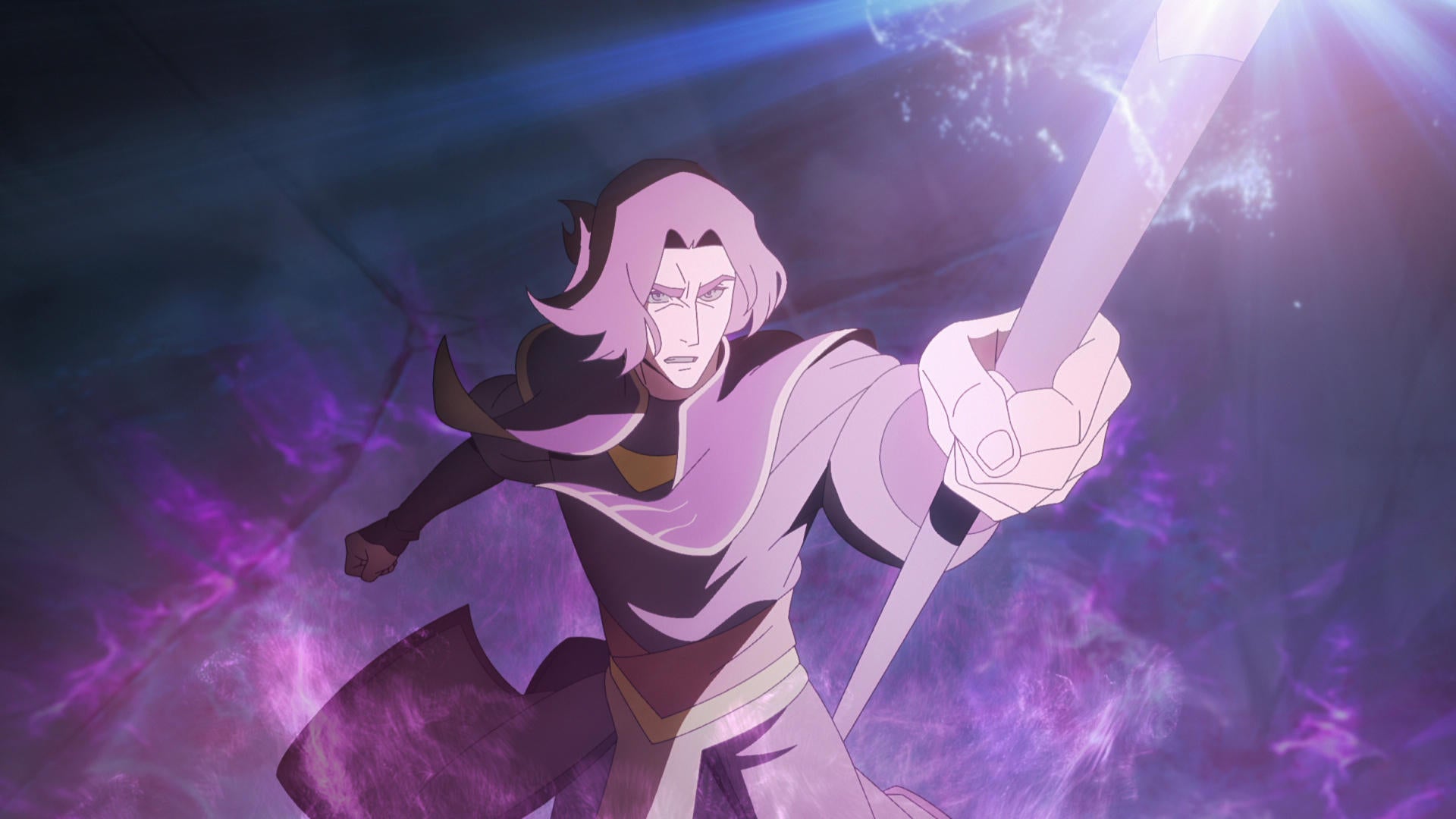
In refreshing my memory of Dragon Age lore before this interview, I was struck by how vast it is. Out of all Dragon Age lore, is there anything that stands out to you as being a really special or definitive representation of what Dragon Age is all about?
MS: I keep thinking of the opening of Dragon Age: Inquisition, where Cassandra grabs you and throws you into jail, or you wake up in her clutches, and she accuses you of destroying the conclave, and then you have to prove you're innocence because she's such a good and righteous person and she's absolutely wrong because you didn't destroy the conclave and there's that great theme. You see it again in the opening of Dragon Age II where they're telling the story of Hawk and then it's like, "That's not how that happened!"
I think that that's always been the heart of Dragon Age, to me, the "Who gets to tell the story?" What agenda do they actually have? All the little embellishments along the way give so much of a sense of being in a real, messy world where people argue about everything and how everything went down. If you ask two people about something in Dragon Age, you get three opinions. It was really interesting to explore that kind of messiness in Absolution with our heroes, with our villains, with our team, and "What should we do next?" You get so many different interpretations and it makes it feel so much more real.
JE I think for myself, I honestly love the character Corypheus. One of the reasons I love him is you could see why he was doing what he was doing. He saw himself as this figure who now needs to save the world. He saw himself as the hero of the story. It's, as he said, "I saw the throne in the maker." He's that kind of character who sees themselves as, "I need to do this on my own. I'm not going to let anyone else, I'm the only one I can trust. I'm the only one who can do this." You have that contrasted with the Herald of Andraste who really leans on the people around them, leans on their followers, leans on their companions.
I think that's interesting to me, that contrast and speaks to the previous point of, "What is a hero? What makes a hero?" In a lot of cases, it's being willing to admit when you are in well over your head and when you don't have all the answers. Corypheus never was able to do that. Corypheus felt like, "I have a plan, I got there, I became blind. Now I'm going to go out and I'm going to make myself basically a god because we need one." I always thought that was super interesting, again, because everyone to Corypheus was a tool. Everyone to Corypheus was a way to get to that ultimate goal; whereas even the most negative Inquisitor still had that feeling of, "I'm leaning on the people. I'm relying on the people around me to get me where I need to get to," and being able to acknowledge when they couldn't do things on their own when they needed that help.
I think that's, in a lot of cases, what Dragon Age is about, what the hero characters is. The people who are willing to acknowledge when they need help to become the heroes and the people who aren't often become the villains. It's pride and it's about ego and about the belief that "Only I have the answers. I'm the only person who can solve this." I think for me, that's always a super interesting thing to explore.
That's the kind of stuff I love to explore going forward. "What does it mean? What other problems exist in this world? What other places do we want to go to?" Where we can see that idea of people who are convinced that they are the only ones who can solve the problems versus the people who do have that ability to lean on others, that ability to take what's given to them, take what's offered, take the help that they need.
Dragon Age: Absolution is streaming now on Netflix. This interview has been edited for clarity and length.
0comments